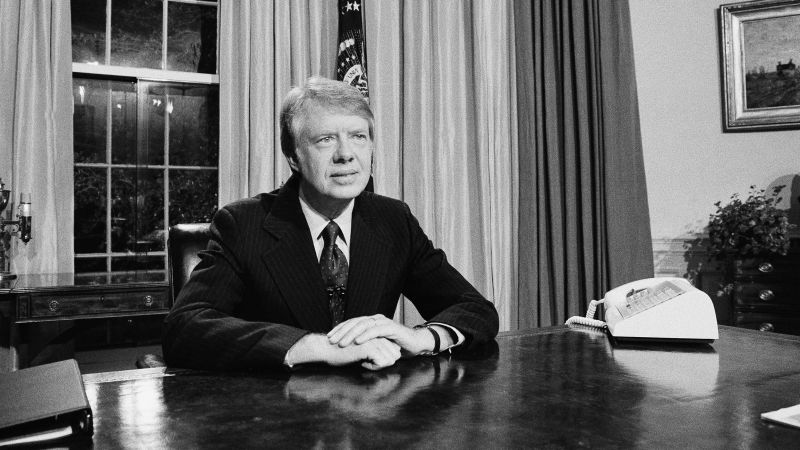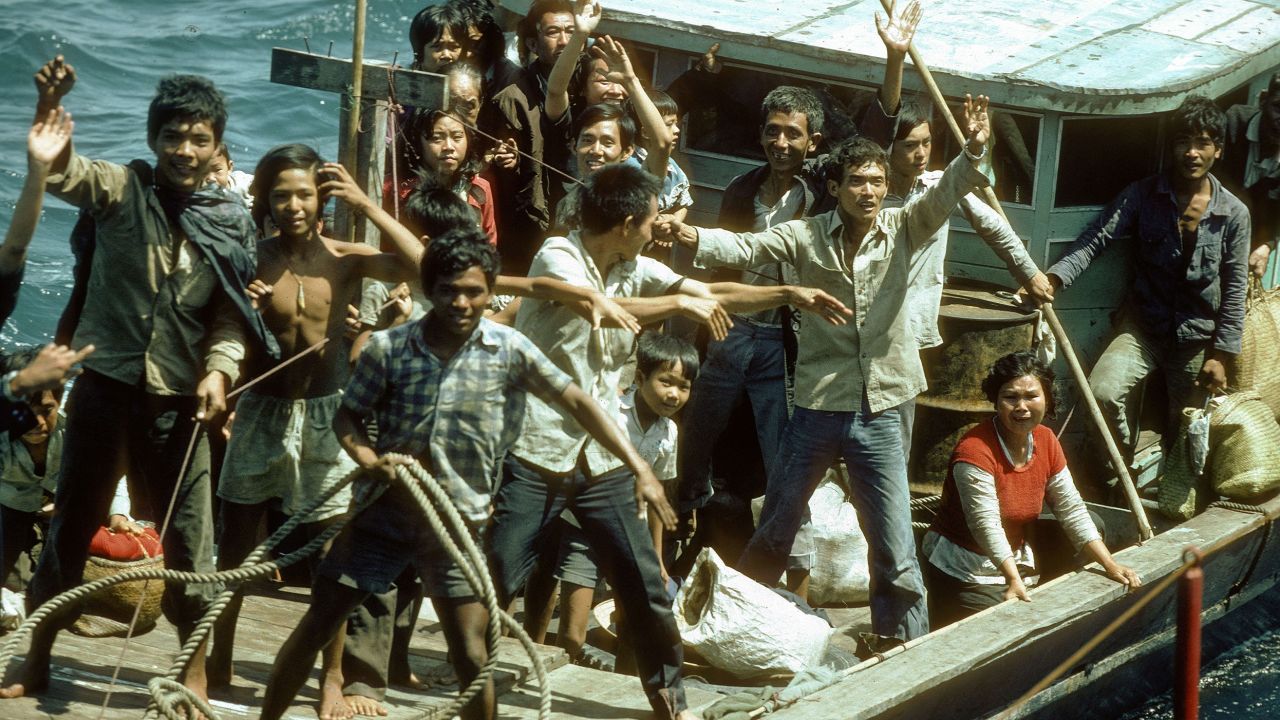
CNN
—
A significant part of Jimmy Carter’s legacy hasn’t gotten much attention, even amid the recent outpouring of tributes to the 39th US president after he entered hospice care.
These steps Carter took during his presidency are still shaping the United States, decades after he left office. But they didn’t help him at the polls.
Because of Carter’s actions, hundreds of thousands of people fleeing persecution had a chance to come to the United States when he was commander-in-chief. And millions more resettled in the US after he left office.
“He was well aware of the political cost,” says Carter biographer Kai Bird, author of “The Outlier: The Unfinished Presidency of Jimmy Carter.” When it came to taking on tough issues, Bird says, Carter didn’t shy away from doing what he thought was right.
And that’s where Carter found himself in the summer of 1979, making a decision that went against what polls said that most Americans wanted.
The scenes from the other side of the world were devastating.
Hundreds of thousands of people fleeing government oppression in Southeast Asia were taking to the sea, and many were drowning as they tried to escape.
A crisis that began before Carter took office was becoming increasingly dire by the day. In 1978, Carter ordered American ships to pick up refugees fleeing by boat. A year later, the exodus had only intensified.
And as world leaders met to discuss top issues facing their countries, Carter took a dramatic stand, announcing the US would double the number of refugees accepted monthly from the region from 7,000 to 14,000. The move, according to news reports at the time, was aimed at pushing other countries to take similarly significant steps.

It was not politically popular. As writer Thu-Huong Ha noted in a 2016 piece for Quartz, a poll from CBS and The New York Times showed that 62% of Americans disapproved. And a Gallup poll indicated 57% of Americans were opposed to the US relaxing its immigration policies for refugees from the region.
Carter did it anyway.
“We are prepared to act with the compassion that has traditionally characterized the United States when confronted with such situations of human crisis,” Carter said in a statement released by the White House as he announced the new policy. “Thousands of human lives are at stake.”
Bee Nguyen says it’s something her family never forgot.
“My mom is what you would consider apolitical. My father is conservative. … (President Carter) was the one political person that both my parents spoke about with respect and fondness, and still do to this day,” says Nguyen, a former Georgia state representative.
That respect, Nguyen says, was earned by actions that Carter took that changed the course of her parents’ lives.
Nguyen says her parents fled Vietnam by boat in 1978. A Thai fisherman rescued them, she says, and they spent months in refugee camps in Thailand.
“My parents, they risked their lives. They left a country in which they experienced the loss of civil liberties, in which my father was incarcerated by his own government. And they were in search of freedom,” Nguyen says.
They found it in Iowa, where they moved in 1979.
“They were only able to do so because of the political courage exercised by President Carter,” she says.
Nguyen was born a few years later, and she says what she heard about Carter growing up – and about Iowa’s then-governor, Republican Robert Ray, who also made a point of welcoming refugees – shaped her own views about America.
Over the years, Americans’ views on their responsibilities toward refugees have fluctuated. Last year 72% of Americans said taking in refugees from countries where people are trying to escape violence and war should be a very or somewhat important goal for US immigration policy, according to a Pew Research Center survey, but opinions varied widely by party, race and ethnicity.
To Nguyen, the stand Carter and other politicians took is just as important today as it was when her parents first arrived.
“It’s important for us to learn as a country, to remember and understand that we as a nation from a values perspective and by law … we promised as a nation to be a safe harbor for people who are fleeing, for people whose lives are in danger,” she says.
Carter’s fateful decision that summer of 1979 wasn’t the only step he took in that direction.
On the frigid day when Faith Akovi Cooper first set foot in the United States with her mother and siblings, Carter was no longer in office. But she says she sees a direct connection between the former US president and the life she’s led since that day in January 1993.
Back then, she was a refugee who’d fled war in Liberia. And thanks to a law Carter signed, the Refugee Act of 1980, her family was able to move to Reston, Virginia.
The law, signed by President Carter in March 1980, created the framework that’s used to help those fleeing persecution around the world seek a better life in the United States.
“My family is here today as a result of that act,” Cooper says. And now, as the International Rescue Committee’s regional director for resettlement, asylum and integration in the Southern US border region, she says she’s even more aware of how vast the law’s impact has been.
“Millions of people have had the chance to rebuild their lives in the United States,” Cooper says.

She was one of them. Rebuilding her life in the US included pursuing a career in global health and eventually going on to work for a leading refugee resettlement organization.
More than 3 million refugees have come to the United States since 1980, including such well-known figures as actor Mila Kunis, singer Regina Spektor and Democratic Rep. Ilhan Omar.
“Millions are taxpaying Americans who have contributed greatly to our communities and to our economy,” Carter said in a 2021 statement commemorating the act’s anniversary.
More than 125,000 refugees from Southeast Asia had fled to the US in the immediate aftermath of Saigon’s fall, and even more would come during Carter’s presidency. While fewer refugees came to the US annually after Carter left office, the country’s refugee resettlement program created by the 1980 act became a sought-after pathway.
The law officially defined a refugee as someone with a “well-founded fear of persecution,” nearly tripled the number refugees the United States would accept and created a process for adjusting that number in emergencies.
“Desperate refugees were drowning and dying from exposure at our doorstep, yet the United States lacked a legal structure to receive them in an orderly way,” Carter said in 2021.
While Carter’s earlier move to welcome more refugees from Vietnam, Cambodia and Laos wasn’t politically popular, the Refugee Act sailed to approval in Congress with nearly unanimous support.
“This was a humanitarian crisis, which Republicans and Democrats agreed on. And even in the midst of a very bitter primary campaign … we were still able to cooperate, because the problem was so massive and so important,” Stuart Eizenstat, Carter’s chief domestic policy adviser during his presidency, recalled in a 2019 interview with HIAS.
But it wasn’t long before Carter would once again find himself making an unpopular decision.
“We were challenged almost immediately, when the act was hardly dry, with crises that were not anticipated,” Eizenstat said in the 2019 HIAS interview.
One of the most significant ones unfolded less than 100 miles from America’s shores.
In April 1980, Cuban President Fidel Castro proclaimed that any Cuban citizen who wanted to emigrate to the United States could do so. The catch? They had to depart from the port of Mariel, about 30 miles from Havana. And they had to have arranged for someone on a boat to pick them up and take them to Florida.

A few weeks later, addressing the League of Women Voters national convention in Miami, Carter noted that the US was a “country of refugees” that would “continue to provide an open heart and open arms” to those fleeing Cuba.
The operation became known as the Mariel boatlift. Carter referred to the boats as “freedom flotillas.” But media coverage of those escaping oppression for the chance at a better life was quickly drowned out by reports claiming that Castro had also taken the opportunity to empty jails and mental institutions.
In an interview with CNN on the network’s first day broadcasting, June 1, 1980, Carter faced questions over a Cuban refugee uprising at an Arkansas resettlement center, where buildings were set ablaze and hostages were taken.
Several thousand hardened criminals did make their way to the United States during that exodus of 125,000 people, says José Manuel García, an associate professor of Hispanic literature and Latin American studies at Florida Southern College. It was a small fraction of the group, says García, who was part of the boatlift himself and has written a book and worked on a documentary sharing the experiences of others who made the journey.

García was 13 years old when he left Cuba with his family. And he says many Cubans who made that same journey went on to build successful businesses and media careers in the United States.
But the bad reputation of the Cubans known as Marielitos firmly took root, even getting a mention in the opening of the 1983 movie “Scarface.”
“Even years later, 40 years later, whenever I tell somebody…the first thing that pops in their mind is, ‘You came with those criminals.’ That is the image that has persisted,” García says.
Carter, who was running for a second term, eventually shifted his stance on the boatlift. Washington and Havana agreed it would end just days before the 1980 election. Analysts argued Carter’s handling of the crisis was a factor contributing to his loss to Ronald Reagan.
Beyond the 1980 presidential vote, there was likely another longer-term cost for Democrats, biographer Bird notes. The boatlift played a role in bolstering South Florida’s conservative political landscape, he says, as many Cubans who fled Castro’s communist regime ended up voting Republican once they became US citizens.
Among more conservative Cuban Americans, Carter is not a popular figure, García says. Many saw his handling of the boatlift as weak, and felt he was easily manipulated by Castro.
But García says he sees Carter’s legacy differently.

“He was a humanitarian. And this is somebody whose primary goal was, ‘We’re going to help these poor people who are escaping communism. They want a better life, and we’re going to do whatever we can to support them,’” he says. “I’ve had all these opportunities because of the fact that the Mariel boatlift happened … and President Carter was willing to help us come to the United States.”
García says he’s always wanted to interview Carter about that time. With the former president reportedly receiving hospice care, he knows it’s not likely he’ll have a chance. But he still thinks about what he’d say if they ever cross paths.
“What an honor it would be for me to tell him, ‘Listen, I’m grateful for what you did for me and my family,’” García says.
Carter’s actions may have cost him reelection, but García says they gave him — and so many others — a chance to live the lives they’d dreamed of having.
